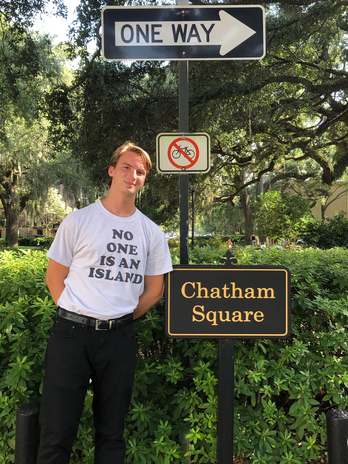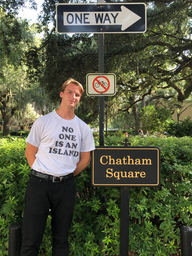Finding someone to interview becomes difficult during a global pandemic. I used to find local business owners, meet up over a cup of coffee, and discuss their organization in order to write an article, but not anymore. While I was (very audibly) lamenting over how difficult it has become to find people to interview, my boyfriend graciously suggested I interview him. At first, I scoffed, thinking he was joking…but then I realized, my boyfriend is actually a pretty interesting guy!

A student in his second year of college, Sam is pursuing a double major in International Affairs and Economics. He’s active in plenty of student organizations, but the most interesting student organization he’s affiliated with has to be the Student Leadership Council of FSU’s College of Social Sciences. Having been recently rejected from my own college’s Student Leadership Council, I thought I would take this piece as an opportunity to move on and grow up. But then Sam suggested I interview him about his off-campus internship at the U. S. Embassy Harare.
Her Campus (HC): So, tell us about your internship!
Sam Bogle (SB): I essentially work ad hoc to the needs of the political unit of the embassy. That means I work on a variety of projects, and so far those projects have included writing about prison conditions in Zimbabwe, and in particular, women’s prison conditions. I have also researched elections, but ultimately that project was scrapped when the president of the country refused to call elections. What I’ve been working on lately is a sheet of political prisoners in order to track their whereabouts, delays in trial proceedings and other injustices when it comes to how they have been treated in the justice system.
HC: What would you say is the most harrowing thing you’ve encountered due to your research?
SB: Definitely the prison conditions; the Zimbabwe prisons and correctional service-even in a global pandemic-has sometimes put 30-50 people in a cell designed for only 15. Access to fresh water is really difficult for more rural prisons-in particular, to talk about women’s prisons, sanitary supplies are extremely low because many families are unable to drop off supplies to their loved ones in prison due to the lockdowns caused by the pandemic. This means that many women are going without the sanitary supplies they need for months at a time.
HC: Are women penalized for dress code infractions despite this shortage of menstrual supplies?
SB: I don’t actually know! I should look into that.

HC: Can you elaborate on the overcrowding conditions?
SB: Of course! This is mainly a problem for male prisoners as they make up a vast majority of those in the system. It makes it very hard to maintain sanitary conditions as, on top of the overcrowding, prisoners aren’t tested before they are brought to pre-trial jail facilities. A lot of people who become sick are also withheld medicine due to a shortage of medical supplies within prisons.
HC: Is there anything uplifting about this internship?
SB: Of course there is! In the course of researching the prison conditions, I was able to speak with Dr. Rita Beauty Nyampinga, who, this year, was awarded an International Woman of Courage award by the U. S. Department of State. She runs several nonprofits for the benefit of women throughout Zimbabwe, including one for female prisoners. Right now, she’s actually out on bail—she has essentially been charged with treason against the government. She knows that the government can come and take her away any day and put her back in a prison facility, where she knows the conditions are bad, yet she still has the courage to speak out every day for the people of Zimbabwe.
HC: Is there anything we can do to help from home?
SB: There are several nonprofits that assist Zimbabwe. In particular, ones that work with prisons are The Female Prisoners Support Trust, VSO International (who contributes many supplies and information about COVID-19 to prisons), and the World UN Food Programme (which recently won the Nobel Peace Prize).
HC: Is there anything else you’d like to sign us off with?
SB: Take the time to learn about the world around you, even the small corners of it…Especially the small corners of it.
Want to see more HCFSU? Be sure to like us on Facebook and follow us on Instagram, Twitter, TikTok, Youtube and Pinterest!



